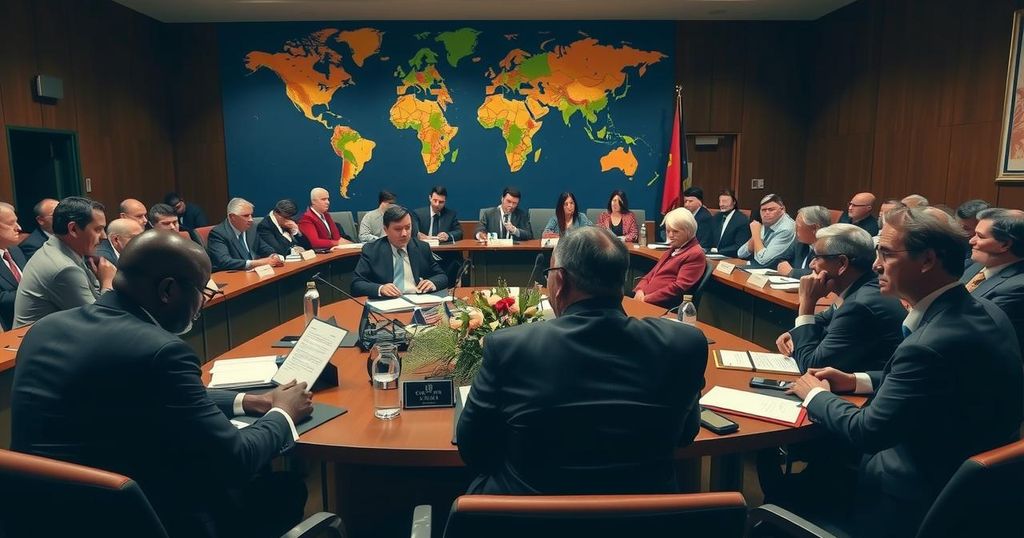Climate change
Technology
AMAZON, ASIA, AZERBAIJAN, BABAYEV, BAKU, BELEM, BRAZIL, CAMBRIDGE INSTITUTE FOR SUSTAINABILITY LEADERSHIP, CASPIAN SEA, CLIMATE CHANGE, COP29, ELIOT WHITTINGTON, ENVIRONMENTAL POLICY, GEOPOLITICS, GREENHOUSE GAS EMISSIONS, KARIN STROHECKER, MULTILATERALISM, PARIS AGREEMENT, REUTERS, RICHARD VALDMANIS, SOUTH AMERICA, U. N, U. S, UNFCCC, VALERIE VOLCOVICI
Jamal Walker
0 Comments
COP29 Summits: Key Climate Funding Deal Faces Sour Reception Amidst Global Tensions
The COP29 climate summit in Baku concluded with a contentious $300 billion climate finance agreement for developing nations, which many deemed inadequate. Challenges persisted due to geopolitical strife, the potential return of Donald Trump’s climate skepticism, and financial reluctance from developed nations. Calls for accountability and trust restoration are essential as Brazil prepares for COP30.
At the conclusion of the recent COP29 climate summit in Baku, President Mukhtar Babayev announced a contentious agreement aimed at providing $300 billion annually to support developing nations facing the challenges posed by climate change. Despite Babayev’s portrayal of the deal as a significant breakthrough, many attendees criticized it as inadequate. The summit, influenced by geopolitical strife, fears regarding the potential withdrawal of the United States from global climate cooperation, and rising isolationist politics, showcased the fractures in international climate discourse.
Preparation for various outcomes highlighted the uncertainty surrounding the talks; many participants anticipated difficulties even before the summit commenced. The impending return of former President Donald Trump, known for his skepticism towards climate change initiatives and intentions to withdraw from the Paris Agreement, further clouded the negotiations. While the U.S. played a role in formulating the financial deal, its capacity to provide future commitments remained uncertain.
The war in Ukraine and geopolitical tensions have diverted focus away from climate issues, leading to strained resources in international cooperation. Consequently, many developed nations expressed reluctance to significantly increase funding commitments, leading to frustration among vulnerable nations such as the Least Developed Countries and small island states. In a visible protest, representatives from these groups temporarily walked out during negotiations, expressing dissatisfaction with their treatment and the outcomes.
As Brazil prepares to host COP30, calls for greater accountability from developed nations resonate strongly. Leaders attending the summit voiced concern over the diminishing trust in international frameworks essential for addressing climate challenges. With heightened skepticism, the future of multilateral climate cooperation appears precarious amidst the persistence of rising emissions and political instability across the globe.
The subject of the article revolves around the outcomes and implications of the COP29 climate summit held in Baku. This international conference aimed to foster dialogue on financing for climate initiatives, particularly focusing on assistance for developing nations amid rising global warming costs. The summit occurred amid geopolitical tensions, changes in U.S. leadership, and a backdrop of an inconsistent commitment to international climate agreements. The dynamics presented at COP29 underscore ongoing challenges facing global climate cooperation amidst rising emissions and the need for substantial financial resources.
In summary, the COP29 summit illustrated the fragility of international climate cooperation. The agreement, while a step forward, raised serious concerns regarding commitment and effectiveness from developed countries. The resounding dissatisfaction from numerous nations underscores the growing mistrust and pressure on future conferences to restore credibility in climate negotiations. The path ahead will depend heavily on how Brazil and other international leaders navigate these challenges while striving for more equitable global climate action.
Original Source: kfgo.com




Post Comment